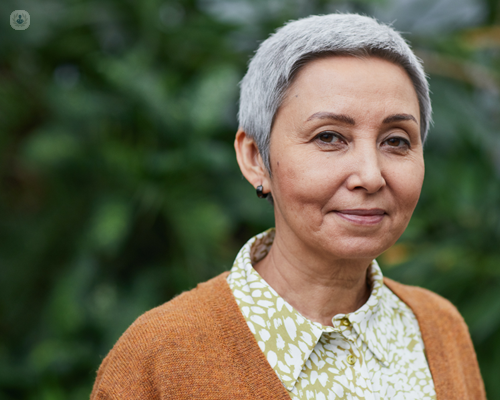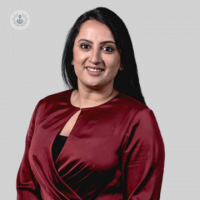Menopause management
Written in association with:Here to tell us all about menopause management is leading GP Dr Rupa Parmar.

What is menopause?
Menopause is a natural biological process. It marks the end of a woman’s menstrual cycles, and can occur between the ages of 45 and 55. However, can take place before or after these ages. Menopause is diagnosed after 12 consecutive months without a period, and it often brings hormonal changes that can lead to various physical and emotional symptoms.
What are the common symptoms of menopause?
The symptoms of menopause can vary widely from woman to woman, but common experiences include:
- Hot flushes and night sweats
- Mood swings, anxiety or irritability
- Sleep disturbances
- Vaginal dryness and discomfort during intercourse
- Reduced libido
- Weight gain and changes in body shape
- Thinning hair or dry skin
Managing menopause symptoms
Menopause management focuses on alleviating symptoms and improving quality of life during this transitional period. There are several approaches available, and women can choose the best option based on their specific needs and medical history:
Hormone replacement therapy (HRT)
HRT is one of the most effective treatments for managing menopause symptoms. It works by replacing the hormones that the body no longer produces. There are two main types of HRT: combined HRT (which includes oestrogen and progesterone) and oestrogen-only HRT (for women who have had a hysterectomy). HRT can help relieve symptoms such as hot flushes, night sweats, mood swings, and vaginal dryness. It’s important to discuss the risks and benefits of HRT with a healthcare provider, however, because it mightn’t be suitable for all.
Non-hormonal treatments
For women who cannot or choose not to use HRT, non-hormonal treatments are available to manage menopause symptoms. These include:
- Lifestyle changes: Maintaining a healthy diet, regular exercise and good sleep hygiene can help manage symptoms like hot flushes and mood changes.
- Medications: Certain medications, such as antidepressants or blood pressure drugs, may be prescribed to relieve specific symptoms like hot flushes or mood swings.
- Vaginal moisturisers or lubricants: These products can help alleviate vaginal dryness and discomfort during intercourse.
Alternative therapies
Some women turn to alternative therapies such as herbal supplements, acupuncture, or yoga to manage their menopause symptoms. While some of these therapies may provide relief, it is important to discuss their use with a healthcare provider, as their effectiveness can vary, and they may interact with other medications.
Mental and emotional well-being
Menopause can affect mental health, causing feelings of anxiety, depression or irritability. Seeking emotional support through counselling, therapy or support groups can be beneficial. Regular physical activity and mindfulness practices such as meditation can also improve mental well-being during menopause.
When to seek medical advice
It’s important to consult a healthcare professional if menopause symptoms are affecting your quality of life. They can help develop a personalised management plan that takes into account your health history and individual preferences. Regular check-ups can also ensure that any potential risks, such as bone density loss or cardiovascular health concerns, are addressed proactively during and after menopause.
Menopause is a natural part of ageing, and with the right approach to management, women can navigate this transition comfortably and healthily.
Are you looking for expert menopause treatment? Arrange a consultation with Dr Parmar via her Top Doctors profile.


